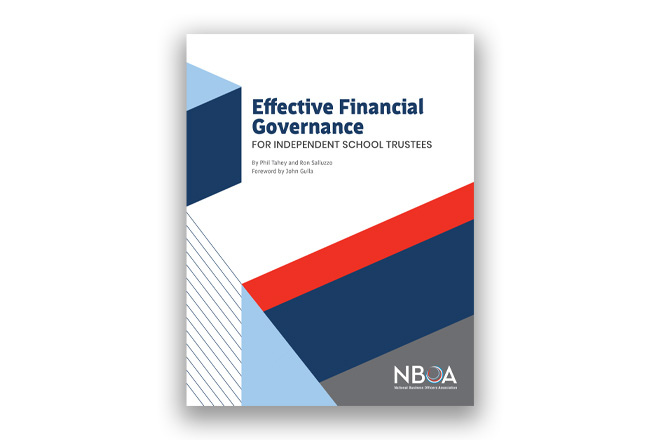Strategies: Better Financial Fiduciaries
A new book from NBOA helps independent school trustees not only understand school finances but also ask management better questions to drive more strategic discussions.
Sep 30, 2020
From the July/August 2020 Net Assets Magazine.
Article by Phil Tahey, independent consultant, and Ron Salluzzo, Attain, LLC
The following is not an uncommon scenario in higher education — is it the case at your school?
Members of the school’s board of trustees are committed and willing to help the institution in any way they can. Yet despite being leaders of their own companies or organizations in various industries, even members of the finance committee may struggle to comprehend the unique fundamentals of nonprofit educational finance and do not always fully understand the numbers presented to them at board meetings. Finance committee meetings, held only three or four times annually, address topics that are not critical to the institution. Committee members received plenty of data but little context or analysis.
Effective Financial Governance for Independent School Trustees
By Phil Tahey and Ron Salluzzo
Foreword by John Gulla
Topics covered
- Financial Drivers and Nonfinancial Measures and Metrics
- Financial Health and Performance
- Resource Allocation
- Liquidity
- Budgets
- Net Assets
- Tuition and Financial Aid
- Contributions and Fundraising
- Auxiliary Services
- Personnel Costs
- Plant Assets and Operations
- Debt Management
- Endowment Funds and UPMIFA
Each chapter includes
- Chapter summary
- Background information
- Key questions for board members
- Possible impacts and strategy
- Information the school can provide the board
Seeing an opportunity to elevate boards’ strategic discussions and decisions regarding schools’ fiscal health, we have partnered with NBOA and authored “Effective Financial Governance for Independent School Trustees.” This follows a similar volume we wrote in 2018 for smaller private colleges, which often struggle financially and need effective oversight. After working with NBOA and NAIS for about four years on the Composite Financial Index to help school leaders make long-term strategic decisions about their financial future, we have now developed a finance primer for independent school trustees. This publication was reviewed by a dozen leaders in independent school governance and finance to ensure it addresses the top issues faced by boards today.
The book aims to help boards and finance committees understand the business model of a nonprofit K–12 independent school and enhance comprehension of their stewardship requirements. The book not only provides background knowledge but outlines questions for trustees, particularly those serving on financially-charged committees, to ask the school’s finance management team. It also references NBOA tools and resources to help both school management and the board ensure the financial health of their schools in perpetuity.
All board members, whether they are on the finance committee or not, are responsible for sound financial governance at their schools. This fiduciary responsibility is statutory, as defined in federal and state not-for-profit statutes and regulations. Beyond that, financially literate boards govern more effectively. We firmly believe that finances are either an enabler or an inhibitor of the school’s strategies, goals and action that are needed to attain the school’s mission and vision.
Purchase at nboa.org/books.
The following is an excerpt of key questions from Chapter 3, Financial Health and Performance.
KEY QUESTIONS
Governance
- How is financial performance of the school definedand measured?
- What do the financial health and financial performance measures indicate?
- Are the measures used by our school common forother schools?
- What drives financial health and financial performance?
- What are the desired levels of financial health and financial performance?
- How do financial health and performance measures correlate with the strategic financial plan?
- Are the same metrics used for internal reports versus external reports (i.e., audited financial statements)?
Process and Content
- How often does the school report on financial health and performance?
- What actions are needed to attain the projected or desired level of financial health and financial performance?
- How sensitive are financial health and performance measures and components to changes?
- How have school-level financial heath and financial performance measures performed over time?
- How have program-level financial heath and financial performance measures performed over time?
- What are the components of financial health? What have they been over time?
- What are the components of expendable net assets?
- How does this school’s financial health compare to that of its competitors for students and faculty?
Phil Tahey, CPA, is an independent consultant to higher education institutions with more than 40 years of experience and service to the higher education community. Ron Salluzzo is a partner in the higher education practice at Attain, LLC, an education consultancy. He is responsible for strategic financial services and enterprise risk services.
To share a strategy that makes your business office more effective or efficient, email netassets@nboa.org. In the subject line, type STRATEGIES.
Download a PDF of this article.



